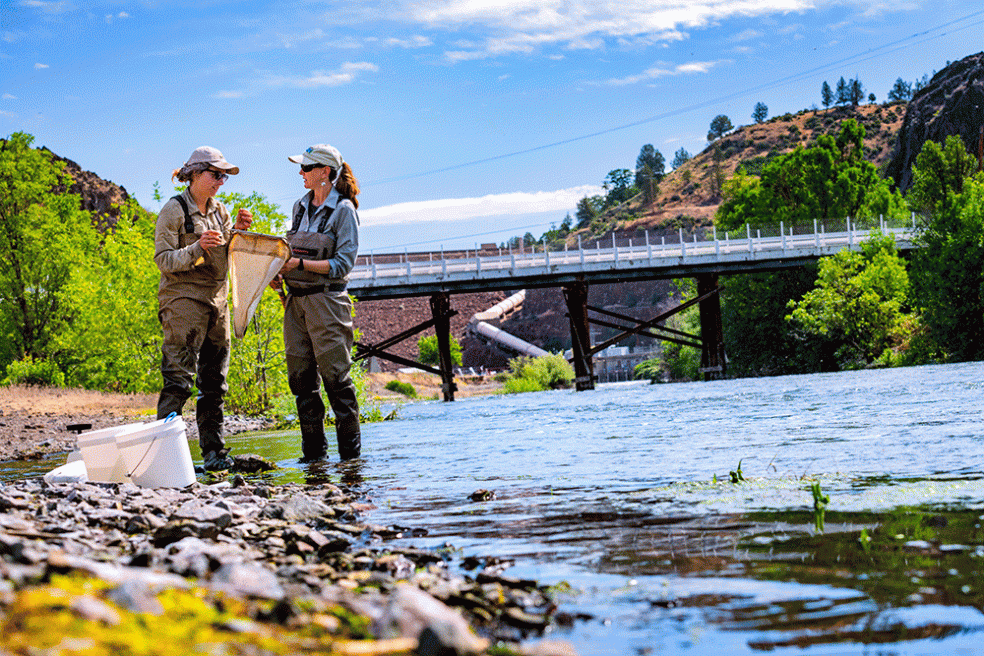
Research projects and programs awarded grants address various issues, from food and housing insecurity among college students to the impact of climate change on redwoods.
“At the Office of Research & Sponsored Programs, we are committed to supporting impactful initiatives that advance our campus’ vision of a more environmentally sustainable and just society. Through our efforts in helping faculty and staff submit proposals for funding and administering grants for Cal Poly Humboldt, we are proud to play a crucial role in cultivating transformative projects that drive positive change in our communities and beyond,” says Kacie Flynn, Executive Director of Humboldt’s Sponsored Programs Foundation (SPF).
Environmental Science & Management Professor Alison O’Dowd is researching and monitoring the Klamath River after removing four dams, the largest dam removal effort in U.S. history. O’Dowd’s research seeks to understand the dynamics of salmonid food webs associated with Klamath Dam removal by examining the water quality, food resources, and diet in the mainstem Klamath River and associated tributaries before, during, and after Klamath Dam removal. With the help of student researchers, the findings will inform fisheries management and fish food resources associated with future dam removal projects and advance the field of disturbance ecology by documenting the effects of a large-scale “planned” disturbance. O’Dowd received $814,121 from the California Wildlife Conservation Board for her research.
Engineering Professors Eileen Cashman and Margaret Lang, along with student researchers, are investigating current and anticipated climate conditions on a six-mile segment of U.S. Highway 101 along Humboldt Bay, a roadway that’s experiencing one of the fastest rates of relative sea level rise (rSLR) on the entire West Coast. The study will analyze the impacts of inaction and evaluate adaptation options based on the best available sea level rise science under various scenarios. Findings will contribute to developing a comprehensive climate adaptation plan for U.S. Highway 101, enabling Caltrans District 1 to advance planning and prioritize and implement a collaborative, cost-effective solution. They received $549,950 from Caltrans for their research.
Maria Gonzalez, Cal Poly Humboldt's Higher Education Initiatives administrator, received a $2.8 million grant from the U.S. Department of Education’s Developing Hispanic-Serving Institutions (DHSI) Program for Caminar Juntos (Walking Together). The project will support Hispanic, low-income, and underserved students as they develop a sense of belonging through academic support services and social integration efforts. The project is designed to reduce retention and graduation gaps for students at Cal Poly Humboldt and transfer students from College of the Redwoods.
With the help of grants, students can receive a steady income and work closely with faculty on research projects to build the knowledge and skills they need to graduate school and enter the job market. Several grant-funded programs support student academic success and social, health, and well-being programs. Faculty and staff benefit by being able to do research in their specialty field while receiving additional pay.
SPF is a large employer in Humboldt County, offering job opportunities to 954 employees annually, including nearly 400 students. SPF’s funds help support the research goals outlined in Humboldt’s strategic plan, which include developing a campus-wide focus on externally funded research and fostering supportive collaborations for grant writing and research.
Fast Facts for the 2022-2023 Fiscal Year:
- 237 new awards, totaling $67.6 million
- 690 Active Projects with a total award value of $165 million
- 339 new proposals submitted, requesting $134.3 million, another record-breaking year
- $2.8 million awarded in grant scholarships and stipends to students
- $4 million in academic grants awarded to support the educational mission of the campus
- $1.3 million awarded in faculty and student travel